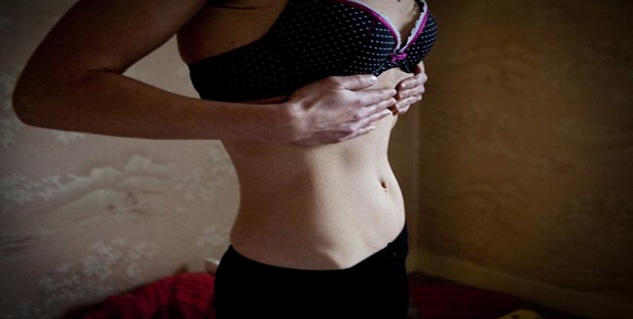
Anorexia nervosa is a common eating disorder. It affects about 1% to 5% of the population and occurs mostly in women between the age group of 13 and 30 (about 90% to 95% cases). Anorexia nervosa, however, can affect any age group and even males. The symptoms or criteria needed to make a diagnosis of anorexia nervosa are:
Table of Content:-
The main symptom of anorexia is deliberately losing a lot of weight, although there are often a number of other physical and psychological signs of a problem.

Intentional Weight Loss
A person with anorexia will want to weigh as little as possible – much less than is healthy for their age and height. They are so afraid of gaining weight they cannot eat normally. In an attempt to lose weight, they may:
- Miss meals, eat very little or avoid eating any fatty foods
- Lie about what and when they've eaten
- Obsessively count the calories in food
- Lie about how much they weigh
- Exercise excessively
- Take appetite suppressants, such as slimming or diet pills
- Make themselves vomit – you may notice they leave the table immediately after meals or have dental problems such as tooth decay or bad breath caused by the acid in vomit
They may also take laxatives or diuretics (medication that helps remove fluid from the body), although in reality these have little effect on calories absorbed from food.
Self-esteem, Body Image and Feelings
People with anorexia often believe their value as a person hinges on their weight and how they look. They may think others will like them more or they will feel happier if they are thinner and see their excessive weight loss in a positive way.
They often have a distorted view of what they look like, thinking they look fat when they are not.
Others may try to hide how thin they are by wearing loose or baggy clothes.
Many people also practise a type of behaviour known as "body checking", which involves persistently and repeatedly:
- Weighing themselves
- Measuring themselves, such as their waist size
- Checking their body in the mirror
People with anorexia also usually have low self-esteem or self-confidence. They may withdraw from relationships, become distant from family and friends, and lose interest in activities they previously enjoyed.
Anorexia can also affect the person's school work or how well they perform their job.

Other Signs of Anorexia
Eating too little for a long time can also result in physical symptoms, such as:
- Bloating or constipation
- Headaches
- Feeling lightheaded or dizzy
- Feeling very tired
- Feeling cold
- Discoloured hands and feet caused by poor circulation
- Dry skin
- Hair loss from the scalp
- Abdominal pain
- Problems sleeping
- Fine downy hair growing on the body
- Brittle nails
In children with anorexia, puberty and the associated growth spurt may be delayed. They may gain less weight than expected – if any – and may be smaller than others of the same age.
Women and older girls with anorexia may stop having their periods (known as amenorrhoea, or absent periods).
Image Source: Getty
How we keep this article up to date:
We work with experts and keep a close eye on the latest in health and wellness. Whenever there is a new research or helpful information, we update our articles with accurate and useful advice.
Current Version